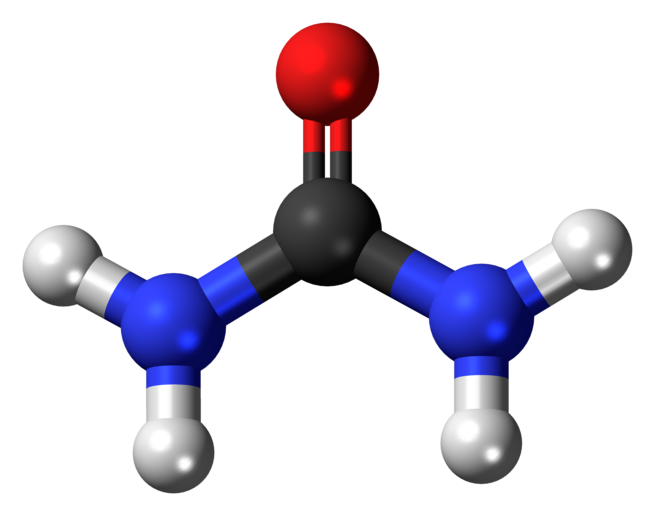
Main Difference
The main difference between Urea and Urine is that the Urea is a chemical compound and Urine is a liquid by-product of metabolism in the bodies of many animals, including humans.
-
Urea
Urea, also known as carbamide, is an organic compound with chemical formula CO(NH2)2. This amide has two –NH2 groups joined by a carbonyl (C=O) functional group.
Urea serves an important role in the metabolism of nitrogen-containing compounds by animals and is the main nitrogen-containing substance in the urine of mammals. It is a colorless, odorless solid, highly soluble in water, and practically non-toxic (LD50 is 15 g/kg for rats). Dissolved in water, it is neither acidic nor alkaline. The body uses it in many processes, most notably nitrogen excretion. The liver forms it by combining two ammonia molecules (NH3) with a carbon dioxide (CO2) molecule in the urea cycle. Urea is widely used in fertilizers as a source of nitrogen and is an important raw material for the chemical industry.
Friedrich Wöhler’s discovery in 1828 that urea can be produced from inorganic starting materials was an important conceptual milestone in chemistry. It showed for the first time that a substance previously known only as a byproduct of life could be synthesized in the laboratory without biological starting materials, contradicting the widely held doctrine of vitalism.
-
Urine
Urine is a liquid by-product of metabolism in humans and in many animals. Urine flows from the kidneys through the ureters to the urinary bladder. Urination results in urine being excreted from the body through the urethra.
The cellular metabolism generates many by-products which are rich in nitrogen and must be cleared from the bloodstream, such as urea, uric acid, and creatinine. These by-products are expelled from the body during urination, which is the primary method for excreting water-soluble chemicals from the body. A urinalysis can detect nitrogenous wastes of the mammalian body.
Urine has a role in the earth’s nitrogen cycle. In balanced ecosystems urine fertilizes the soil and thus helps plants to grow. Therefore, urine can be used as a fertilizer. Some animals use it to mark their territories. Historically, urine was also used for gunpowder production, cleaning, tanning of leather and dyeing of textiles.
Human urine and feces are collectively referred to as human waste or human excreta, and are managed with a sanitation system. Livestock urine and feces also require proper management if the livestock population density is high.
-
Urea (noun)
A water-soluble organic compound, CO(NH2)2, formed by the metabolism of proteins and excreted in the urine.
-
Urea (noun)
Any N-substituted derivative of urea, with the general formula (R1R2N)CO(NR3R4).
-
Urine (noun)
Liquid excrement consisting of water, salts and urea, which is made in the kidneys, stored in the bladder, then released through the urethra.
-
Urine (verb)
To urinate.
